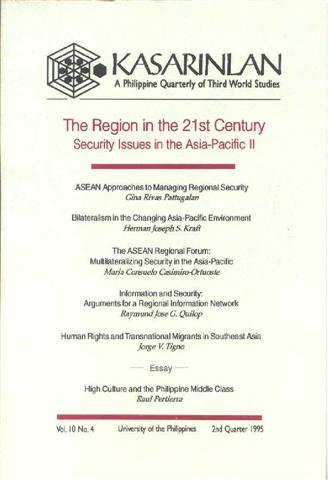ASEAN Approaches to Managing Regional Security
Abstract
The ASEAN is one of the regional organizations whose usefulness have outlived the Cold War. By investing in institutions and developing norms, its member-states have overcome obstacles to regional political stability and cooperation in the old order. With the demise of bipolarity and the emergence of a more complex post- Cold War security environment, however, ASEAN faces the twin challenges of remaining a relevant and formidable regional actor and fostering a wider regionalism beyond the confines of Southeast Asia. In this new regional security configuration, the association needs to expand regional security dialogue to include actors in the wider Asia-Pacific through the ASEAN Regional Forum; broaden the application of its code of conduct, the TACSEA, to cover the entire Southeast Asian region, transform Southeast Asia into a nuclear-weapons-free zone as well as a zone of peace, freedom and neutrality and get the cooperation of countries with nuclear capabilities, and pursue a self-reliant and collective military pressure.
Published
2008-06-05
How to Cite
PATTUGALAN, Gina Rivas.
ASEAN Approaches to Managing Regional Security.
Kasarinlan: Philippine Journal of Third World Studies, [S.l.], v. 10, n. 4, june 2008.
ISSN 2012-080X.
Available at: <https://journals.upd.edu.ph/index.php/kasarinlan/article/view/872>. Date accessed: 29 aug. 2025.
Section
Features
By submitting a manuscript, the authors agree that the exclusive rights to reproduce and distribute the article have been given to the Third World Studies Center.



